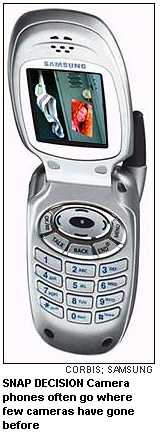|
 They're
still upset at Aqualand, a leisure center near Cologne where families
flock for weekend fun. The manager reluctantly admits that in early
January someone surreptitiously took pictures of women swimming
naked during one of the center's regular nudist evenings and posted
them on the Internet, but he refuses to comment further. The Cologne
police confirm that they have been looking into the case but "since
no one submitted a complaint, we haven't opened a formal investigation,"
says the police's spokesman. The grainy quality of the images suggests
that they were taken by a mobile phone with a tiny built-in digital
camera. They're
still upset at Aqualand, a leisure center near Cologne where families
flock for weekend fun. The manager reluctantly admits that in early
January someone surreptitiously took pictures of women swimming
naked during one of the center's regular nudist evenings and posted
them on the Internet, but he refuses to comment further. The Cologne
police confirm that they have been looking into the case but "since
no one submitted a complaint, we haven't opened a formal investigation,"
says the police's spokesman. The grainy quality of the images suggests
that they were taken by a mobile phone with a tiny built-in digital
camera.
At the David
Lloyd Leisure Centre, a fitness club in Edinburgh, a memo appeared
on the notice board in December, strongly urging members "not
to use camera phones in the locker rooms." The center's manager
says there have been no incidents — yet: "But it's clear
that camera phones will become an issue."
Welcome to
the era of mobile-phone spying. As digital cameras have invaded
the mainstream in recent years, concerns about privacy and Web-based
voyeurism have been growing. But as a range of mobile phones with
the ability to take, send and receive color digital photos and videos
hits the market, those concerns are accelerating. Now, for some,
it is irresistibly easy to use a phone to capture and send images.
Japanese train commuters have been caught snapping pictures under
women's skirts; in Saudi Arabia, a governmental commission has forbidden
camera phones altogether; and in Italy, the government's delegate
for privacy is drafting a camera phone-specific recommendation.
"Despite the small number of camera phones currently in circulation,
there is already alarm," says Giuseppe Busia, the delegate's
director of telecommunications.
This feature,
which goes by the name of multimedia messaging system (MMS), was
introduced in Europe last year. Today, Nokia, Sony Ericsson, NEC,
Samsung and Siemens are marketing a dozen phone models (1500 to
1800) that are or can be equipped with a still camera. More are
in the pipeline — including video phones, such as the models
to be launched soon by Hutchison in Italy and the U.K. About 14
million camera phones were sold in 2002, half of them in Japan.
Several million pictures already zip around Europe's wireless networks
every day.
Most of the
discussion about camera phones so far has focused on their benefits:
send a wireless postcard to a friend, or snap a picture of a damaged
car for insurance purposes. But the cases of abuse suggest that
technology is empowering the voyeur. By adding the ability to snap
and send a picture instantly or post it on the Internet, camera
phones magnify the power of impulse: in a moment of anger or just
mischief, a reputation can be destroyed without possibility of appeal.
The quality of the pictures is still poor (it will improve fast),
but camera phones go into spaces where cameras don't often go: restrooms,
locker rooms, private houses, courts of justice, medical and psychiatric
hospitals, night clubs, casinos. And unlike ordinary cameras, this
technology is still unfamiliar. People aren't suspicious —
yet — when someone holds up a phone: they think he's just writing
an SMS.
Future models
may even feature controls allowing users to turn them on remotely
to snap and automatically send pictures (leave one hidden in your
bedroom if you think that your husband is cheating) or to listen
in to conversations ("forget" the cell phone in your boss's
office just before his boss walks in). When camera phones become
ubiquitous, protecting privacy will be extremely difficult. The
legal implications of this are being assessed in several countries.
Currently, camera phones can't be compared to surveillance cameras,
whose widespread use has a firm, but narrow, legal basis. But they
will very soon need a similar sort of public debate and regulation.
"Because of the possibility to disseminate the pictures immediately,
the potential for improper use is huge, from individual privacy
breaches to industrial espionage," says Christopher Kuner,
a partner in the Brussels office of law firm Hunton & Williams.
The time doesn't
seem very far off when we will walk into someone's digital film
just by leaving home, and when the next celebrity indiscretion will
be broadcast, in living color, off a 200-g video phone.
|